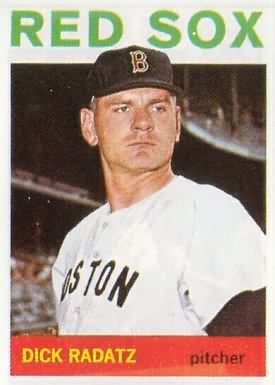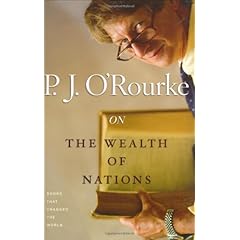A post on
Hit and Run deals with the origin of the music to which the "Star Spangled Banner" is set, an old British drinking song "To Anacreon in Heaven" (man, you learn something new everyday). Two main
criticisms of the "SSB" are that it's too hard to sing and that its lyrics are too bellicose. I personally don't find the song's required vocal range or lyrical content a problem (Jeez, we were being invaded at the time!). That said, if it came down to a change, "America the Beautiful" isn't a bad substitute.
A look at the Wikipedia
list of national anthems shows just how good we have it. Many hours (albeit amusing ones) could be wasted enjoying the BabelFish translations.
For those who object to the "SSB", I counter that at least it's short, in it's common usage at least. This is in contrast to a rendition of Argentina's national anthem that I once heard, which I swear seemed to last a good 10 minutes. In regards to the bellicosity of the lyrics I can only say: Holy Shit! check out some of the stanzas contained in Mexico's national anthem, "Mexicanos, al grito de guerra":
Chorus:
Mexicans, at the cry of war,
Grasp the steel and the bridle,
And let the earth's core tremble
To the roar of the cannon.
And let the earth's core tremble
To the roar of the cannon!
Verses:
Oh Fatherland! may your brow be wreathed with the olive
By the divine archangel of Peace
For in heaven, your eternal destiny
has been written by the finger of God.
But if a foreign enemy should dare
To profane your ground with his step,
Think, oh beloved Fatherland! that heaven
Gave you a soldier in each son.
In bloody combats you have seen them,
Love for you beating in their breasts,
Serenely facing the shrapnel,
And seeking death or glory.
If the memory of the ancient exploits Of your sons inflames the mind,
The memory of triumph will become
Immortal to crown your brow.
As the lightning bolt blasts the oak
Into the deep torrent,
Vanquished and impotent discord
Fell at the feet of the archangel.
May the blood of your sons never again
Be spilled in fights between brothers;
May only he encounter the steel in their hands
Who has insulted your sacred name.
The terrible sword of the immortal
warrior of Zempoala defends you,
And his invincible arm sustains
Your sacred tricoloured flag.
He will be in peace and war
The leader of the joyous Mexican,
Because he surrounded his weapons
With brilliance in the fields of honour.
War, war without truce upon him who means
To sully the blazon of the Fatherland;
War, war! Soak our homeland's flags
In the waves of blood.
War, war! In the mountains and the valley,
The dreadful cannons thunder,
And the deafening echoes resound
The cries of Union! Liberty!
O Fatherland, before your unarmed sons
Bend their necks under the yoke,
Your countrysides will be watered with blood
And in blood will be their footprints.
And your temples, palaces, and towers
Will fall with terrible thunder,
And their ruins shall live to say,
"This was the fatherland of a thousand heroes."
If to the struggle against a hostile host
The warrior trumpet calls us,
The sacred banner of Iturbide,
O Mexicans, follow valiantly.
And to the faithful war horses,
Let the vanquished ensigns be a carpet;
Let the laurels of triumph give shade
To the forehead of the great captain.
Let the warrior return proud to his native home
To sing his victory;
Waving the palms of glory
That he captured in the fight.
Let his bloody laurels turn
To garlands of myrtle and roses,
Which the love of daughters and wives
Also award to the brave.
And he who, to the burning shrapnel's stroke
Falls in the altars of the Fatherland,
Will in reward obtain a tomb
Where the light of glory shines.
And, from Iguala, the beloved ensign
Laced to his bloody sword,
Crowned with immortal laurel,
He will make a cross of his grave.
Fatherland, Fatherland! Your sons swear
To breathe out their breath on your altars,
If the clarion with its warlike tone
Calls them to struggle with valour.
For you the garlands of olive!
For them a memory of glory!
For you a laurel of victory!
For them a tomb of honour!
Apparently the anthem dates from 1853, after the Mexican-American War, so perhaps they had a right to feel a bit pissed-off. However, the Mexican defeat in that war would seem to have invalidated some of the lyrics even before they were written. To be fair though, it seems only the first and last stanzas are commonly used.
Lest I seem too harsh on "Mexicans, To the War Cry", the third stanza of the "SSB" (whose lyrics follow in full) is pretty combative (and smug):
O say, can you see, by the dawn's early light,
What so proudly we hail'd at the twilight's last gleaming?
Whose broad stripes and bright stars, thro' the perilous fight,
O'er the ramparts we watch'd, were so gallantly streaming?
And the rockets' red glare, the bombs bursting in air,
Gave proof thro' the night that our flag was still there.
O say, does that star-spangled banner yet wave
O'er the land of the free and the home of the brave?
On the shore dimly seen thro' the mists of the deep,
Where the foe's haughty host in dread silence reposes,
What is that which the breeze, o'er the towering steep,
As it fitfully blows, half conceals, half discloses?
Now it catches the gleam of the morning's first beam,
In full glory reflected, now shines on the stream:
'Tis the star-spangled banner: O, long may it wave
O'er the land of the free and the home of the brave!
And where is that band who so vauntingly swore
That the havoc of war and the battle's confusion,
A home and a country should leave us no more?
Their blood has wash'd out their foul footsteps' pollution.
No refuge could save the hireling and slave
From the terror of flight or the gloom of the grave:
And the star-spangled banner in triumph doth wave
O'er the land of the free and the home of the brave.
O thus be it ever when free-men shall stand
Between their lov'd home and the war's desolation;
Blest with vict'ry and peace, may the heav'n-rescued land
Praise the Pow'r that hath made and preserv'd us a nation!
Then conquer we must, when our cause it is just,
And this be our motto: “In God is our trust!”
And the star-spangled banner in triumph shall wave
O'er the land of the free and the home of the brave!






















